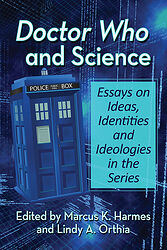
Product prices and availability are accurate as of the date/time indicated and are subject to change. Any price and availability information displayed on Amazon site(s) at the time of purchase will apply to the purchase of this product.
 |
||
|
|
||
|
|

Cover blurb: This is the first book to explore this scientific landscape from a broad spectrum of research fields: from astronomy, genetics, linguistics, computing, history, sociology and science communication through gender, media and literature studies. Contributors ask: What sort of scientist is the Doctor? How might the TARDIS translation circuit and regeneration work? Did the Doctor change sex or gender when regenerating into Jodie Whittaker? How do Doctor Who’s depictions of the Moon and other planets compare to the real universe? Why was the program obsessed with energy in the 1960s and 1970s, Victorian scientists and sciences then and now, or with dinosaurs at any time? Do characters like Missy and the Rani make good scientist role models? How do Doctor Who technical manuals and public lectures shape public ideas about science? | |||||||||||||||||||||||||||||||||||||||||||||||||||||||||||||||||
| Go back | ||